unit4 the earthquake language point[上学期]
文档属性
| 名称 | unit4 the earthquake language point[上学期] | 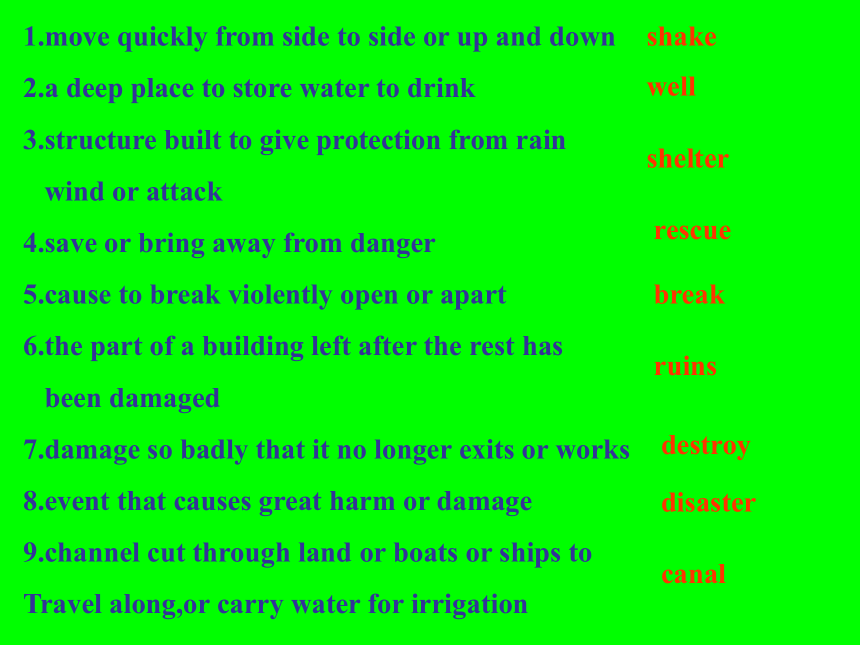 | |
| 格式 | rar | ||
| 文件大小 | 95.2KB | ||
| 资源类型 | 教案 | ||
| 版本资源 | 人教版(新课程标准) | ||
| 科目 | 英语 | ||
| 更新时间 | 2007-02-01 08:16:00 | ||
图片预览

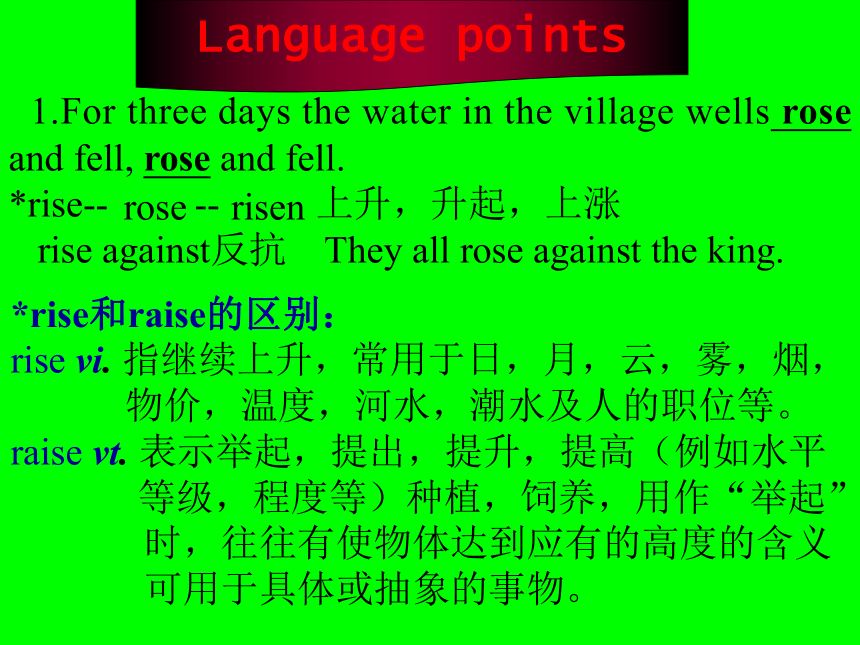
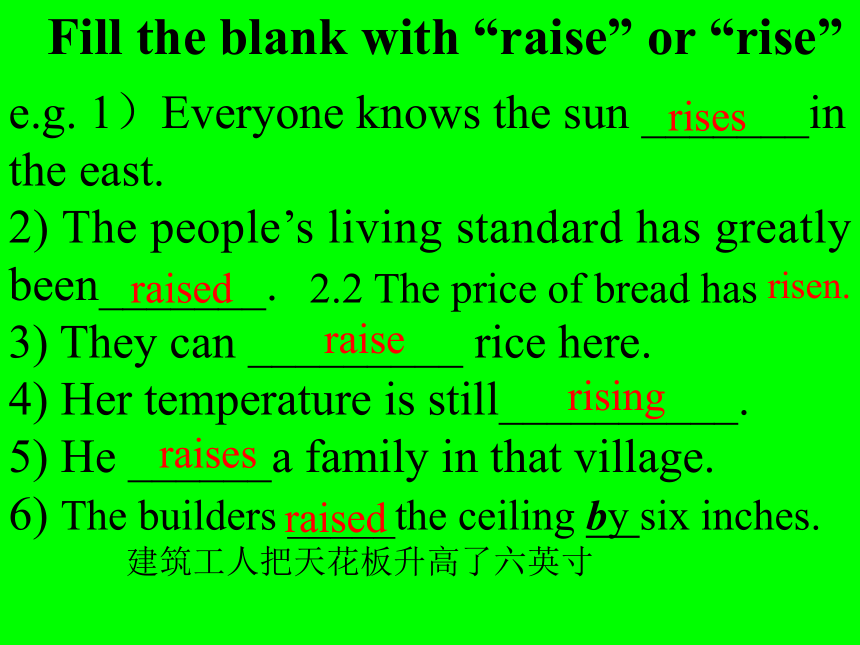
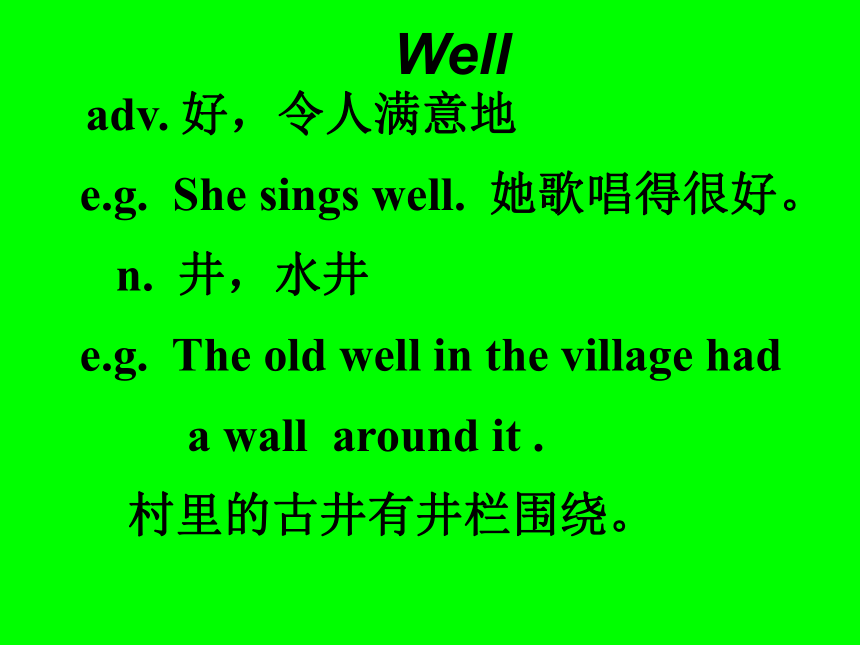
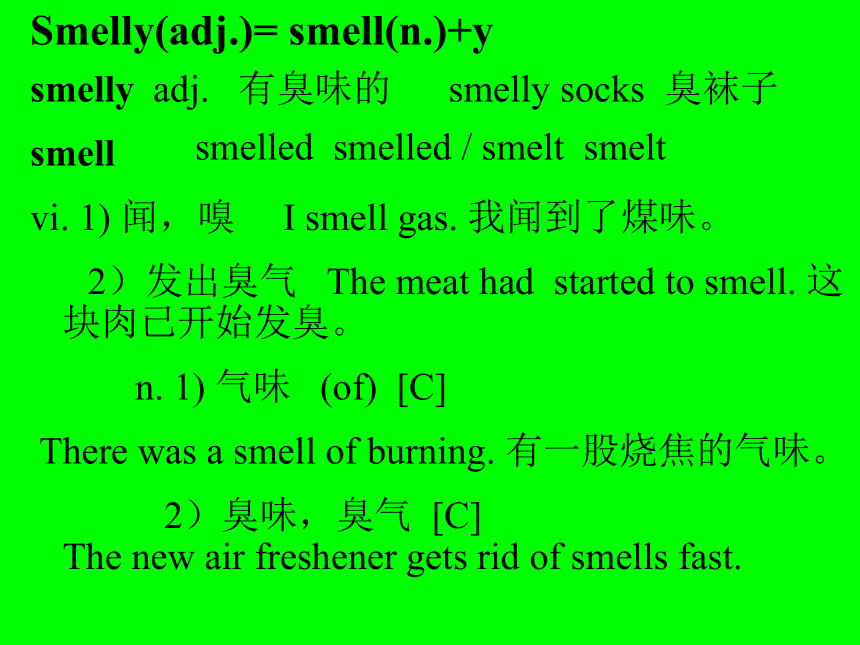
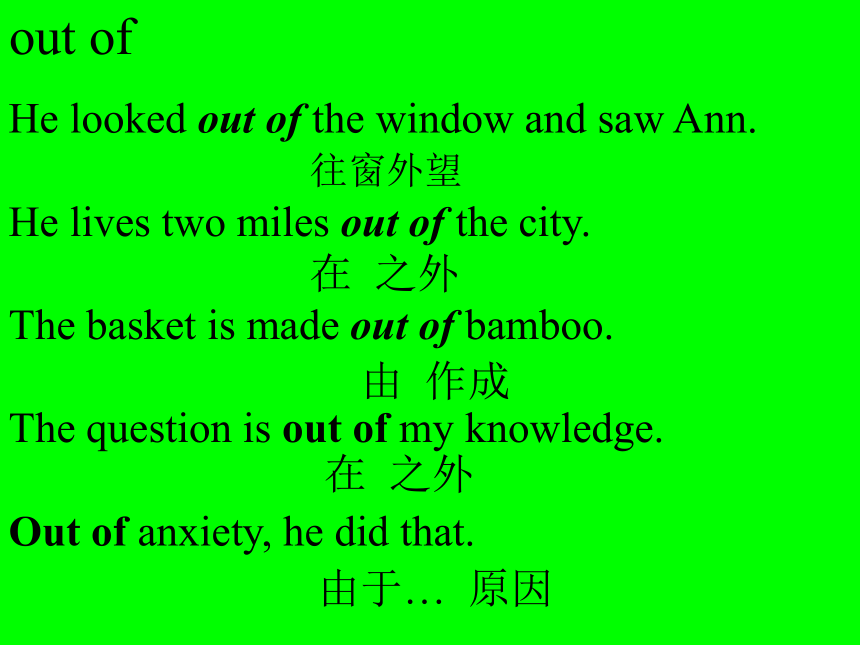
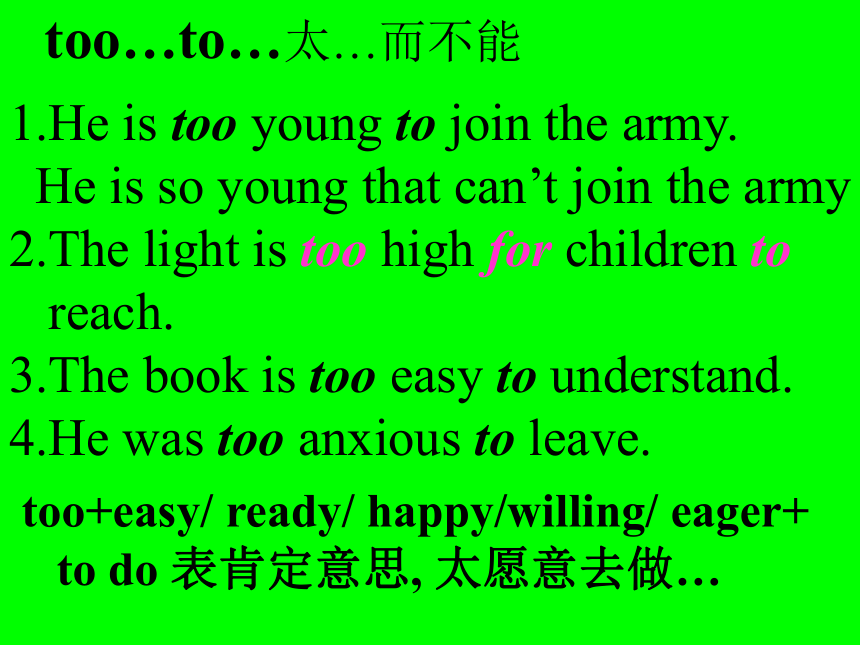
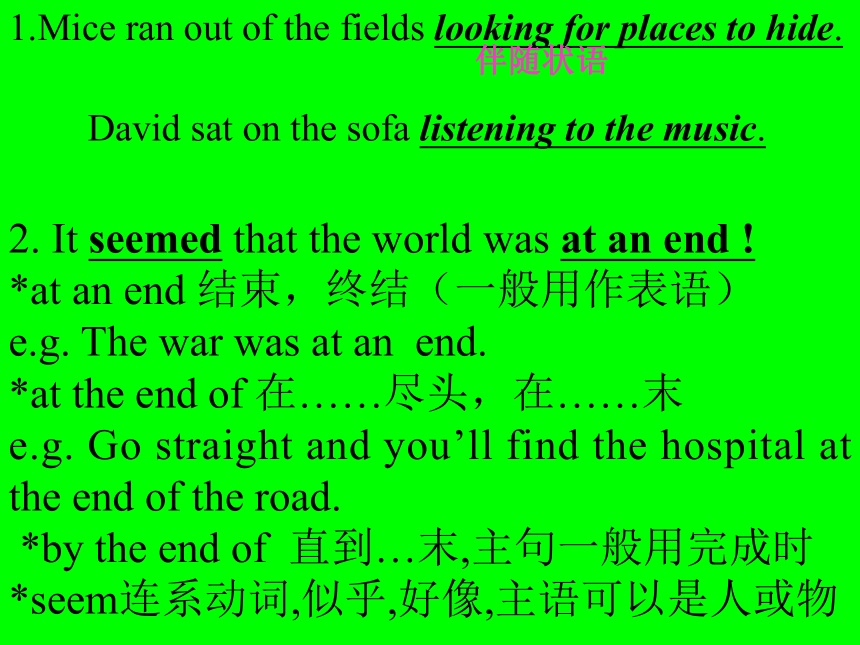
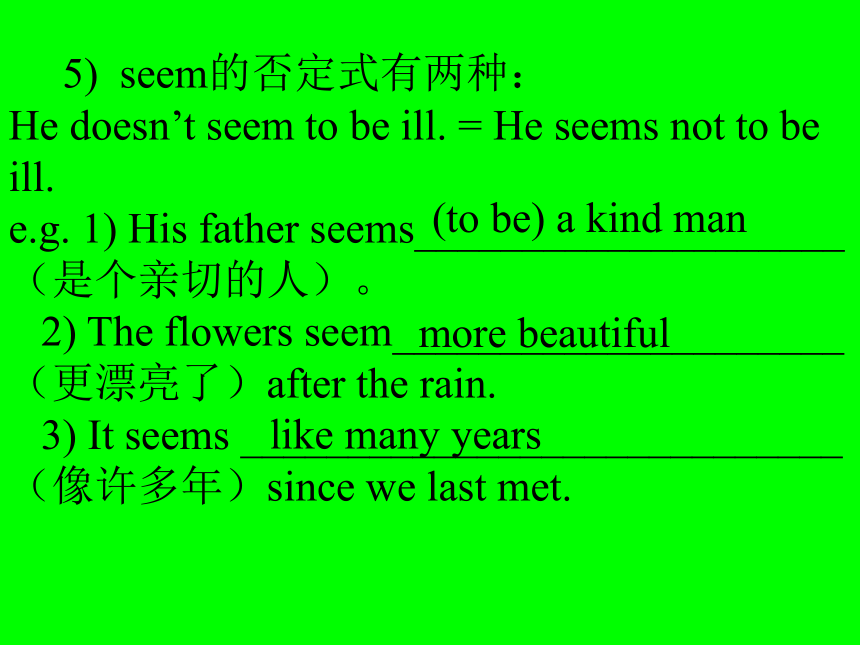
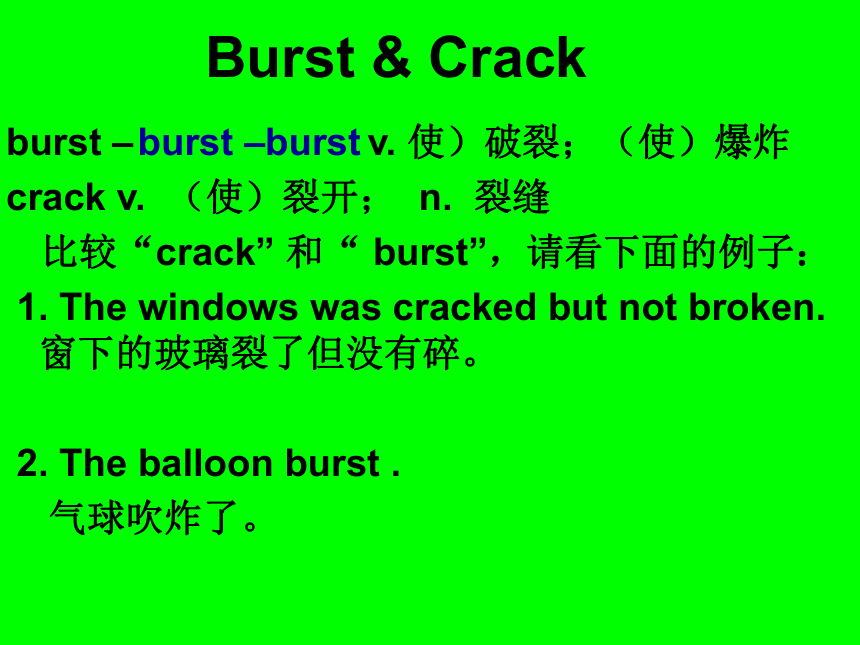
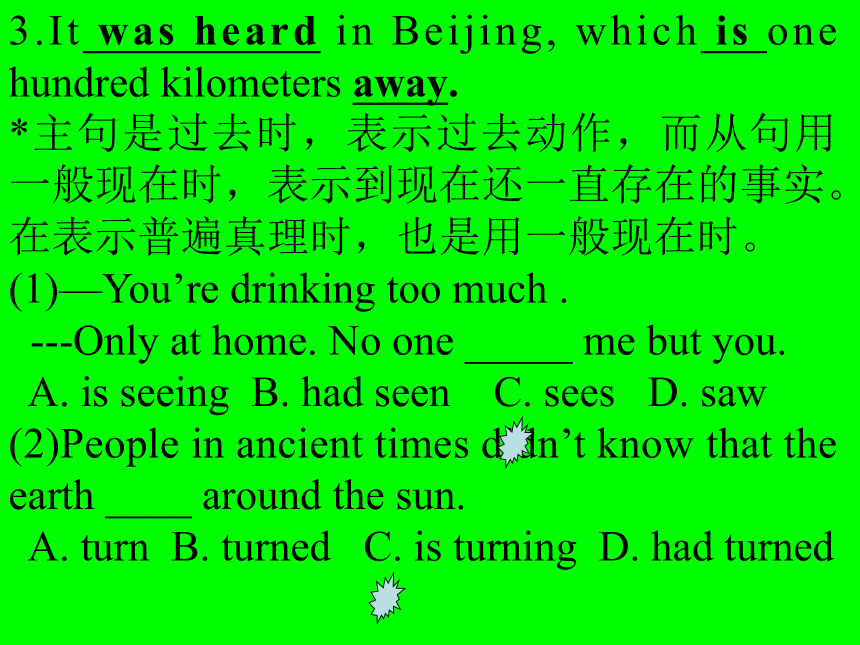
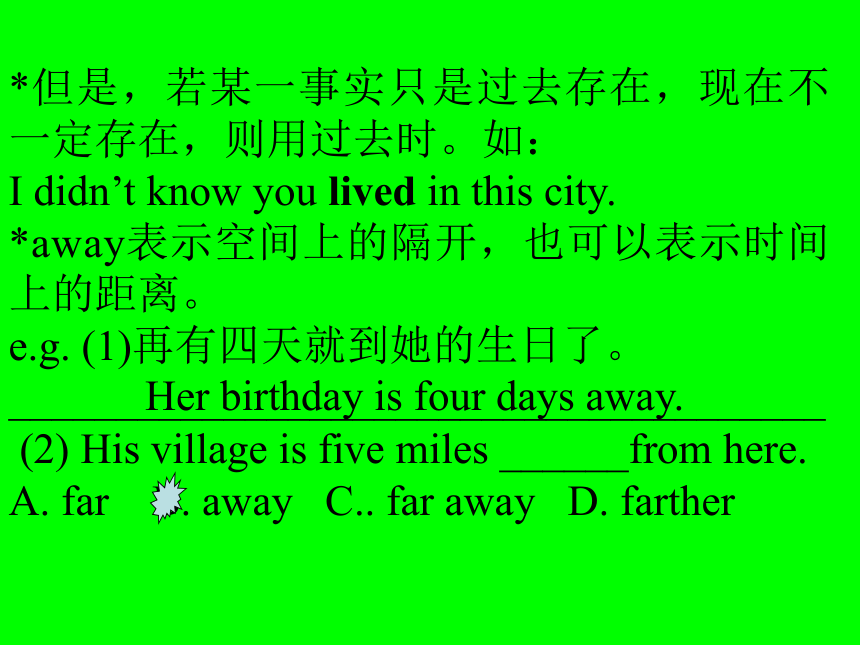
文档简介
课件33张PPT。1.move quickly from side to side or up and down
2.a deep place to store water to drink
3.structure built to give protection from rain
wind or attack
4.save or bring away from danger
5.cause to break violently open or apart
6.the part of a building left after the rest has
been damaged
7.damage so badly that it no longer exits or works
8.event that causes great harm or damage
9.channel cut through land or boats or ships to
Travel along,or carry water for irrigation shakewellshelterrescuebreakruinsdestroydisastercanal 1.For three days the water in the village wells rose and fell, rose and fell.
*rise-- -- 上升,升起,上涨
Language pointsroserisenrise against反抗They all rose against the king.*rise和raise的区别:
rise vi. 指继续上升,常用于日,月,云,雾,烟,
物价,温度,河水,潮水及人的职位等。
raise vt. 表示举起,提出,提升,提高(例如水平
等级,程度等)种植,饲养,用作“举起”
时,往往有使物体达到应有的高度的含义
可用于具体或抽象的事物。
e.g. 1)Everyone knows the sun _______in the east.
2) The people’s living standard has greatly been_______.
3) They can _________ rice here.
4) Her temperature is still__________.
5) He ______a family in that village.
6) The builders _____the ceiling by six inches.
建筑工人把天花板升高了六英寸Fill the blank with “raise” or “rise”risesraisedraiserisingraises2.2 The price of bread hasrisen. raised Well adv. 好,令人满意地
e.g. She sings well. 她歌唱得很好。
n. 井,水井
e.g. The old well in the village had
a wall around it .
村里的古井有井栏围绕。smelly adj. 有臭味的 smelly socks 臭袜子
smell
vi. 1) 闻,嗅 I smell gas. 我闻到了煤味。
2)发出臭气 The meat had started to smell. 这块肉已开始发臭。
n. 1) 气味 (of) [C]
There was a smell of burning. 有一股烧焦的气味。
2)臭味,臭气 [C] The new air freshener gets rid of smells fast.Smelly(adj.)= smell(n.)+ysmelled smelled / smelt smeltout of He looked out of the window and saw Ann.
He lives two miles out of the city.
The basket is made out of bamboo.
The question is out of my knowledge.
Out of anxiety, he did that.往窗外望在 之外由 作成由于… 原因在 之外too…to…太…而不能1.He is too young to join the army.
He is so young that can’t join the army
2.The light is too high for children to
reach.
3.The book is too easy to understand.
4.He was too anxious to leave. too+easy/ ready/ happy/willing/ eager+
to do 表肯定意思, 太愿意去做…2. It seemed that the world was at an end !
*at an end 结束,终结(一般用作表语)
e.g. The war was at an end.
*at the end of 在……尽头,在……末
e.g. Go straight and you’ll find the hospital at the end of the road.
*by the end of 直到…末,主句一般用完成时
*seem连系动词,似乎,好像,主语可以是人或物
1.Mice ran out of the fields looking for places to hide.
伴随状语David sat on the sofa listening to the music. 5)? seem的否定式有两种:
He doesn’t seem to be ill. = He seems not to be ill.
e.g. 1) His father seems____________________(是个亲切的人)。
2) The flowers seem_____________________ (更漂亮了)after the rain.
3) It seems ____________________________
(像许多年)since we last met.
(to be) a kind manmore beautifullike many yearsBurst & Crackburst – v. 使)破裂;(使)爆炸
crack v. (使)裂开; n. 裂缝
比较“crack” 和“ burst”,请看下面的例子:
1. The windows was cracked but not broken. 窗下的玻璃裂了但没有碎。
2. The balloon burst .
气球吹炸了。burst –burst3.It was heard in Beijing, which is one hundred kilometers away.
*主句是过去时,表示过去动作,而从句用一般现在时,表示到现在还一直存在的事实。
在表示普遍真理时,也是用一般现在时。
(1)—You’re drinking too much .
---Only at home. No one _____ me but you.
A. is seeing B. had seen C. sees D. saw
(2)People in ancient times didn’t know that the earth ____ around the sun.
A. turn B. turned C. is turning D. had turned
*但是,若某一事实只是过去存在,现在不一定存在,则用过去时。如:
I didn’t know you lived in this city.
*away表示空间上的隔开,也可以表示时间上的距离。
e.g. (1)再有四天就到她的生日了。
______________________________________
(2) His village is five miles ______from here.
A. far B. away C.. far away D. farther Her birthday is four days away.5.Two-thirds of the people died or were injured
during the earthquake.分数表达法分子(基数词为one)分母(序数词用单数)eg. 1/3 one-third
1/5 one-fifth分子(基数词不为one)分母+s (序数词用复数)`eg. 2/3 two-thirds
3/5 three-fifths前面有带整数的分数用数字表示,但放句首时则用
文字. Eg: 2?a)Your bag is 2? times the weight of mine.
b) Two and a quarter inches of rain fell over the
weekend.百分数表达法数词+percent (%) 表示 “百分之…”
eg. 75% -
90% ,65% ,……
分数词作主语时,
若分数所指的是可数名词,则谓语动词多用复数;eg. 80% of the trees were cut down.
若指不可数名词,谓语动词多用单数:
eg. 50% of the water in the bottle has gone. seventy five percent*injure vt. 使受伤,伤害,可以表示“损害名誉,伤害感情等”
*injured adj.受伤的,受委屈的
*区别hurt, injure, wound
hurt “受伤“的一般用语,既可指______伤害,亦可指______伤害。
wound指______,如枪伤,刀伤,剑伤,尤指在战斗中受伤。
injure一般指由于______________而受伤。
用hurt, injure, wound填空
(1)He was slightly ________ in the accident.
(2)He got ________in the battle.
(3)His words ________ my feelings.
(4)He spoke in a ________voice.身体情感外伤事故所受的伤injuredwoundedhurtinjured4.In fifteen terrible seconds a large city lay in ruins.
*lie ( lay, lain )v. to be, remain or be kept in a certain state 处于某种状态。
翻译:战争过后,这个村庄成了一片废墟。
_____________________________________
*ruin n. 毁灭,崩溃,遗迹,废墟(常用复数)
v. 毁灭,毁坏, 使破产
*in ruins: severely damaged or destroyed 毁坏了,失败的,荒芜的,成为废墟(一般用作表语)
翻译:他的事业已完全失败。(career)
__________________________________
这座古代建筑已成了废墟。
________________________________ The village lay in ruins after the war.His career is in ruinsThis old building has been in ruins*区分destroy, ruin, damage:
destroy:完全的毁坏,无法修复
ruin:非暴力的,对美好事物的毁坏
damage:局部的损伤,使整体变得无价值
e.g. (1)The car _____in the accident is being repaired.
(2)--What happened to the priceless works of art?
--The earthquake __________ them..
(3) She poured water all over my painting, and __________it. damageddestroyedruined1.thousands of ... 数以千计的…(形容很多)
类似的:lots of / hundreds of / millions of…
2.“the number of” …的数目
“a number of ” 许多…
= a lot of / many
hundreds of thousands of 成千上万
tens of thousands of 成百上千
Page 78 point 22
do all the works谓语动词用单数谓语动词用复数6. Everywhere they looked nearly everything was destroyed.
*everywhere 用做连词,等于wherever, no matter where,引导让步状语从句。
互译:1)无论他走到哪儿,他都和朋友保持联系。
__________________________________________
2)Everywhere I go , I find the same thing .
__________________________________________
*everywhere作副词时,一般情况下都用在句尾。如:
我四处去找,但是找不到。
___________________________________________
*everywhere 有时作名词,如:
到处都似乎很安静。
_____________________________________Everywhere he goes,he contacts with his friends.I find everywhere, but I can’t find itEverywhere seems quiet.7. Sand now filled the wells instead of water.
*instead of 代替,而不是,后接
等,但不能接句子)
*instead是副词,在句中单独作状语,置于句首时,意为“相反地”
(1)Judy didn’t answer. _________, she looked out of the taxi window.
A. But B. However C. Instead D. And
(2)It’s me that should ask you instead of you _____me.
A. ask B. asked C. to ask D. asking
(3)He studies in the evening instead ________the day.
A. / B. of C. of during D. of on 名词,动词,动名词useless useless adj. 无用的,无价值的 “less” 否定后缀, “没有…的” ,“无……的”
其一般的组词结构:名词+less →形容词
例如:childless 没有儿女的
harmless 没有害处的
countless 数不清的
priceless( price 价钱,价格)是没有价
值的意思吗???
错,这是个特殊的例子,
priceless 是无价的,贵重的 last v. 持续,延续
The meeting lasted for two hours
adv. 上一个
last week 上一周
adj. 最后的
the last one 最后一个 Shock v. (使)震惊,震动 n.
shocked adj. 受惊的 = frightenedThe army came to rescue1.rescue v. rescue from
he rescued the man from drowning.
n. 援救,营救
2.organize v. 组织 organizer
organized adj. well-organized
organization n. 组织
4. bury v. 埋葬
bury oneself
be buried in
专心致力于….8. All hopes was not lost.并没有丧失所有希望。
= Not all hope was lost.
该句为不完全否定,也可称之为部分否定。
*all…not…= not all …, some but not all 一些,但不是全部
当not与all, every, everyone, everything, both连用时,皆表示不完全的否定。
e.g. 1)Not all the girls left.(=Only some of them left.)
2) Not all the children are noisy.(= Some of the children are not noisy.)
3)闪光的并不都是金子。____________________________________________
4)并不是人人都在。____________________________________________Not all glitter is goldNot all people are here*no, none, no one, neither 表示全部的否定。
*对两者以上的全部否定应用none of,其后的谓语动词既可以用单数也可以用复数形式,如:
(1)None of us were allowed to go there.
_______________________________________
(2)None of these reports is very helpful.
_______________________________________
*either表示“(两者中)任何一个”,any表示“(三者或三者以上中的)任何一个”。
我们二人都不准去那里。这两份报告都没有用dig-
dig out sth. =dig sth. out 把……(从……)挖出来 to dig the car out of the snow
shelter n. 庇护所 take … for shelter
In the storm I took a tree for shelter. V. shelter (from)
These plants must be sheltered from direct sunlight.这种植物必须遮蔽,免受日光照射。
survivor n. [C] 幸存者 survive vt. 幸存
Few people survived the fire. 这次火灾没有几人幸免于难。 dug-dug9.The army organized teams to dig out those who were trapped and to bury the dead.
*the dead 意为“死难者”。
*形容词前加表示同一类的人或物,通常表示复数意义。
Tell the meanings of the following phrases and sentences:
(1)?the old and the sick (2)the blind
(3)the impossible
(4)The rich are not always happy.
P73 point 6To the east of 在…东边,不接壤
In the east of 在…东边,在其里面
On the east of 在…东边,与其接壤1.Japan lies _____ the east of China.
2. Canada is _______ the north of American.
3. Qingdao lies _____the east of Shangdong province.reach
Please look at page 76 and finish all worksfresh
1.新鲜的 fresh fruit
2.空气等清凉的 fresh air
3.不熟练的,生手的
break fresh ground 着手新事业 fresh water 淡水judge 法官 判断,判定
judge by 以…来判断,以…来看
Don’t judge a man by his clothes.
judge from…从…看,根据…可以看出.
Judge from what he said, he must be an honest
man.
judge of 判断,评价
I am no judging of food.honor an honor person
show honor to sb 对 表示敬意
have the honor to do sth 很荣幸地
in honor of /in one’s honor 为 纪念,以 名义
on one’s honor 以 名誉担保Prepare vt. Preparation n.
prepare +n. 直接做….
prepare for doing sth/ sth 为.. 做准备
prepare to do sth准备去做…. fall down 倒下
be proud of 自豪的, 以… 为自豪
I am proud of you. imagine vt. 后接名词,代词,动名词,从句
imagine sb.to be 想象某人
1.we can imagine _______________.(他的悲伤)
2.I didn’t imagine ________________________
in my childhood. 我会成为一位作家
3.don’t imagine yourself ______________________
(总是正确的)
4.Can you imagine____ _______________________
你能想象我看到它后有多么惊讶吗?imagine后接的宾语从句为否定意义时,要将否定
转移,与 think ,suppose用法相同his sadnessmy becoming a writerto be always correct.how much I was surprised to see it?Happen to sb./sth. 发生在某人/某物身上
Happen to do sth.
Happen & take place:
Happen是指事件的偶然发生;后者是有计划,有
准备的发生,有“举行”之意。
1.Great changes ____________in my town since 1998
2.The May Fourth Movement ___________in 1919.Shake- - vt./ vi
Be shaken with 因..而颤抖
Be shaken at 对..感到震撼
Shake hand with sb.和某人握手happenedtook placeshookshakensFilling the blacks with the first given letter:Several days before July 28,1976,many s______things happened in Tangshan. They were signs for the e_______. But people in the city of Tangshan didn’t think m_______of these. At 3:42am that day,the earth began to s________,which d_________the city. Many people,including workers and doctors,came to r_______those t_________under the ruins. Later that afternoon,another big earthquake struck Tangshan. More people were killed or injured and more buildings f________down. Soldiers were called in to help the rescue workers. T________were organized to dig out the trapped and b________the dead.trangearthquakeuchhakeestroyedescuerappedelleamsury
2.a deep place to store water to drink
3.structure built to give protection from rain
wind or attack
4.save or bring away from danger
5.cause to break violently open or apart
6.the part of a building left after the rest has
been damaged
7.damage so badly that it no longer exits or works
8.event that causes great harm or damage
9.channel cut through land or boats or ships to
Travel along,or carry water for irrigation shakewellshelterrescuebreakruinsdestroydisastercanal 1.For three days the water in the village wells rose and fell, rose and fell.
*rise-- -- 上升,升起,上涨
Language pointsroserisenrise against反抗They all rose against the king.*rise和raise的区别:
rise vi. 指继续上升,常用于日,月,云,雾,烟,
物价,温度,河水,潮水及人的职位等。
raise vt. 表示举起,提出,提升,提高(例如水平
等级,程度等)种植,饲养,用作“举起”
时,往往有使物体达到应有的高度的含义
可用于具体或抽象的事物。
e.g. 1)Everyone knows the sun _______in the east.
2) The people’s living standard has greatly been_______.
3) They can _________ rice here.
4) Her temperature is still__________.
5) He ______a family in that village.
6) The builders _____the ceiling by six inches.
建筑工人把天花板升高了六英寸Fill the blank with “raise” or “rise”risesraisedraiserisingraises2.2 The price of bread hasrisen. raised Well adv. 好,令人满意地
e.g. She sings well. 她歌唱得很好。
n. 井,水井
e.g. The old well in the village had
a wall around it .
村里的古井有井栏围绕。smelly adj. 有臭味的 smelly socks 臭袜子
smell
vi. 1) 闻,嗅 I smell gas. 我闻到了煤味。
2)发出臭气 The meat had started to smell. 这块肉已开始发臭。
n. 1) 气味 (of) [C]
There was a smell of burning. 有一股烧焦的气味。
2)臭味,臭气 [C] The new air freshener gets rid of smells fast.Smelly(adj.)= smell(n.)+ysmelled smelled / smelt smeltout of He looked out of the window and saw Ann.
He lives two miles out of the city.
The basket is made out of bamboo.
The question is out of my knowledge.
Out of anxiety, he did that.往窗外望在 之外由 作成由于… 原因在 之外too…to…太…而不能1.He is too young to join the army.
He is so young that can’t join the army
2.The light is too high for children to
reach.
3.The book is too easy to understand.
4.He was too anxious to leave. too+easy/ ready/ happy/willing/ eager+
to do 表肯定意思, 太愿意去做…2. It seemed that the world was at an end !
*at an end 结束,终结(一般用作表语)
e.g. The war was at an end.
*at the end of 在……尽头,在……末
e.g. Go straight and you’ll find the hospital at the end of the road.
*by the end of 直到…末,主句一般用完成时
*seem连系动词,似乎,好像,主语可以是人或物
1.Mice ran out of the fields looking for places to hide.
伴随状语David sat on the sofa listening to the music. 5)? seem的否定式有两种:
He doesn’t seem to be ill. = He seems not to be ill.
e.g. 1) His father seems____________________(是个亲切的人)。
2) The flowers seem_____________________ (更漂亮了)after the rain.
3) It seems ____________________________
(像许多年)since we last met.
(to be) a kind manmore beautifullike many yearsBurst & Crackburst – v. 使)破裂;(使)爆炸
crack v. (使)裂开; n. 裂缝
比较“crack” 和“ burst”,请看下面的例子:
1. The windows was cracked but not broken. 窗下的玻璃裂了但没有碎。
2. The balloon burst .
气球吹炸了。burst –burst3.It was heard in Beijing, which is one hundred kilometers away.
*主句是过去时,表示过去动作,而从句用一般现在时,表示到现在还一直存在的事实。
在表示普遍真理时,也是用一般现在时。
(1)—You’re drinking too much .
---Only at home. No one _____ me but you.
A. is seeing B. had seen C. sees D. saw
(2)People in ancient times didn’t know that the earth ____ around the sun.
A. turn B. turned C. is turning D. had turned
*但是,若某一事实只是过去存在,现在不一定存在,则用过去时。如:
I didn’t know you lived in this city.
*away表示空间上的隔开,也可以表示时间上的距离。
e.g. (1)再有四天就到她的生日了。
______________________________________
(2) His village is five miles ______from here.
A. far B. away C.. far away D. farther Her birthday is four days away.5.Two-thirds of the people died or were injured
during the earthquake.分数表达法分子(基数词为one)分母(序数词用单数)eg. 1/3 one-third
1/5 one-fifth分子(基数词不为one)分母+s (序数词用复数)`eg. 2/3 two-thirds
3/5 three-fifths前面有带整数的分数用数字表示,但放句首时则用
文字. Eg: 2?a)Your bag is 2? times the weight of mine.
b) Two and a quarter inches of rain fell over the
weekend.百分数表达法数词+percent (%) 表示 “百分之…”
eg. 75% -
90% ,65% ,……
分数词作主语时,
若分数所指的是可数名词,则谓语动词多用复数;eg. 80% of the trees were cut down.
若指不可数名词,谓语动词多用单数:
eg. 50% of the water in the bottle has gone. seventy five percent*injure vt. 使受伤,伤害,可以表示“损害名誉,伤害感情等”
*injured adj.受伤的,受委屈的
*区别hurt, injure, wound
hurt “受伤“的一般用语,既可指______伤害,亦可指______伤害。
wound指______,如枪伤,刀伤,剑伤,尤指在战斗中受伤。
injure一般指由于______________而受伤。
用hurt, injure, wound填空
(1)He was slightly ________ in the accident.
(2)He got ________in the battle.
(3)His words ________ my feelings.
(4)He spoke in a ________voice.身体情感外伤事故所受的伤injuredwoundedhurtinjured4.In fifteen terrible seconds a large city lay in ruins.
*lie ( lay, lain )v. to be, remain or be kept in a certain state 处于某种状态。
翻译:战争过后,这个村庄成了一片废墟。
_____________________________________
*ruin n. 毁灭,崩溃,遗迹,废墟(常用复数)
v. 毁灭,毁坏, 使破产
*in ruins: severely damaged or destroyed 毁坏了,失败的,荒芜的,成为废墟(一般用作表语)
翻译:他的事业已完全失败。(career)
__________________________________
这座古代建筑已成了废墟。
________________________________ The village lay in ruins after the war.His career is in ruinsThis old building has been in ruins*区分destroy, ruin, damage:
destroy:完全的毁坏,无法修复
ruin:非暴力的,对美好事物的毁坏
damage:局部的损伤,使整体变得无价值
e.g. (1)The car _____in the accident is being repaired.
(2)--What happened to the priceless works of art?
--The earthquake __________ them..
(3) She poured water all over my painting, and __________it. damageddestroyedruined1.thousands of ... 数以千计的…(形容很多)
类似的:lots of / hundreds of / millions of…
2.“the number of” …的数目
“a number of ” 许多…
= a lot of / many
hundreds of thousands of 成千上万
tens of thousands of 成百上千
Page 78 point 22
do all the works谓语动词用单数谓语动词用复数6. Everywhere they looked nearly everything was destroyed.
*everywhere 用做连词,等于wherever, no matter where,引导让步状语从句。
互译:1)无论他走到哪儿,他都和朋友保持联系。
__________________________________________
2)Everywhere I go , I find the same thing .
__________________________________________
*everywhere作副词时,一般情况下都用在句尾。如:
我四处去找,但是找不到。
___________________________________________
*everywhere 有时作名词,如:
到处都似乎很安静。
_____________________________________Everywhere he goes,he contacts with his friends.I find everywhere, but I can’t find itEverywhere seems quiet.7. Sand now filled the wells instead of water.
*instead of 代替,而不是,后接
等,但不能接句子)
*instead是副词,在句中单独作状语,置于句首时,意为“相反地”
(1)Judy didn’t answer. _________, she looked out of the taxi window.
A. But B. However C. Instead D. And
(2)It’s me that should ask you instead of you _____me.
A. ask B. asked C. to ask D. asking
(3)He studies in the evening instead ________the day.
A. / B. of C. of during D. of on 名词,动词,动名词useless useless adj. 无用的,无价值的 “less” 否定后缀, “没有…的” ,“无……的”
其一般的组词结构:名词+less →形容词
例如:childless 没有儿女的
harmless 没有害处的
countless 数不清的
priceless( price 价钱,价格)是没有价
值的意思吗???
错,这是个特殊的例子,
priceless 是无价的,贵重的 last v. 持续,延续
The meeting lasted for two hours
adv. 上一个
last week 上一周
adj. 最后的
the last one 最后一个 Shock v. (使)震惊,震动 n.
shocked adj. 受惊的 = frightenedThe army came to rescue1.rescue v. rescue from
he rescued the man from drowning.
n. 援救,营救
2.organize v. 组织 organizer
organized adj. well-organized
organization n. 组织
4. bury v. 埋葬
bury oneself
be buried in
专心致力于….8. All hopes was not lost.并没有丧失所有希望。
= Not all hope was lost.
该句为不完全否定,也可称之为部分否定。
*all…not…= not all …, some but not all 一些,但不是全部
当not与all, every, everyone, everything, both连用时,皆表示不完全的否定。
e.g. 1)Not all the girls left.(=Only some of them left.)
2) Not all the children are noisy.(= Some of the children are not noisy.)
3)闪光的并不都是金子。____________________________________________
4)并不是人人都在。____________________________________________Not all glitter is goldNot all people are here*no, none, no one, neither 表示全部的否定。
*对两者以上的全部否定应用none of,其后的谓语动词既可以用单数也可以用复数形式,如:
(1)None of us were allowed to go there.
_______________________________________
(2)None of these reports is very helpful.
_______________________________________
*either表示“(两者中)任何一个”,any表示“(三者或三者以上中的)任何一个”。
我们二人都不准去那里。这两份报告都没有用dig-
dig out sth. =dig sth. out 把……(从……)挖出来 to dig the car out of the snow
shelter n. 庇护所 take … for shelter
In the storm I took a tree for shelter. V. shelter (from)
These plants must be sheltered from direct sunlight.这种植物必须遮蔽,免受日光照射。
survivor n. [C] 幸存者 survive vt. 幸存
Few people survived the fire. 这次火灾没有几人幸免于难。 dug-dug9.The army organized teams to dig out those who were trapped and to bury the dead.
*the dead 意为“死难者”。
*形容词前加表示同一类的人或物,通常表示复数意义。
Tell the meanings of the following phrases and sentences:
(1)?the old and the sick (2)the blind
(3)the impossible
(4)The rich are not always happy.
P73 point 6To the east of 在…东边,不接壤
In the east of 在…东边,在其里面
On the east of 在…东边,与其接壤1.Japan lies _____ the east of China.
2. Canada is _______ the north of American.
3. Qingdao lies _____the east of Shangdong province.reach
Please look at page 76 and finish all worksfresh
1.新鲜的 fresh fruit
2.空气等清凉的 fresh air
3.不熟练的,生手的
break fresh ground 着手新事业 fresh water 淡水judge 法官 判断,判定
judge by 以…来判断,以…来看
Don’t judge a man by his clothes.
judge from…从…看,根据…可以看出.
Judge from what he said, he must be an honest
man.
judge of 判断,评价
I am no judging of food.honor an honor person
show honor to sb 对 表示敬意
have the honor to do sth 很荣幸地
in honor of /in one’s honor 为 纪念,以 名义
on one’s honor 以 名誉担保Prepare vt. Preparation n.
prepare +n. 直接做….
prepare for doing sth/ sth 为.. 做准备
prepare to do sth准备去做…. fall down 倒下
be proud of 自豪的, 以… 为自豪
I am proud of you. imagine vt. 后接名词,代词,动名词,从句
imagine sb.to be 想象某人
1.we can imagine _______________.(他的悲伤)
2.I didn’t imagine ________________________
in my childhood. 我会成为一位作家
3.don’t imagine yourself ______________________
(总是正确的)
4.Can you imagine____ _______________________
你能想象我看到它后有多么惊讶吗?imagine后接的宾语从句为否定意义时,要将否定
转移,与 think ,suppose用法相同his sadnessmy becoming a writerto be always correct.how much I was surprised to see it?Happen to sb./sth. 发生在某人/某物身上
Happen to do sth.
Happen & take place:
Happen是指事件的偶然发生;后者是有计划,有
准备的发生,有“举行”之意。
1.Great changes ____________in my town since 1998
2.The May Fourth Movement ___________in 1919.Shake- - vt./ vi
Be shaken with 因..而颤抖
Be shaken at 对..感到震撼
Shake hand with sb.和某人握手happenedtook placeshookshakensFilling the blacks with the first given letter:Several days before July 28,1976,many s______things happened in Tangshan. They were signs for the e_______. But people in the city of Tangshan didn’t think m_______of these. At 3:42am that day,the earth began to s________,which d_________the city. Many people,including workers and doctors,came to r_______those t_________under the ruins. Later that afternoon,another big earthquake struck Tangshan. More people were killed or injured and more buildings f________down. Soldiers were called in to help the rescue workers. T________were organized to dig out the trapped and b________the dead.trangearthquakeuchhakeestroyedescuerappedelleamsury
